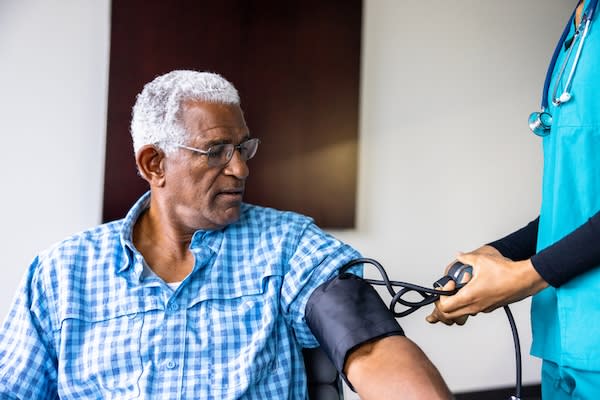Navigating your journey through menopause

[5 MIN READ]
In this article:
-
Menopause is a natural aging process for roughly half the world’s population. What was once a taboo topic is now being discussed more openly.
-
The average age for menopause in North America is 51, but changes can begin as early as your 30s and 40s.
-
Hormonal changes associated with menopause may increase your risk of other health conditions such as osteoporosis and cardiovascular disease.
Navigating your journey through menopause
Menopause used to be a taboo topic, but if you’re on social media or read the news, you know it’s having a moment — finally!
Roughly half the world’s population will experience menopause. After all, it’s a natural part of the aging process. But what is menopause and how do you know you’re in it? What else do you need to know about the menopause journey?
On a recent episode of Providence’s Talk with a Doc podcast, host Jennifer Semenza spoke with board-certified nurse midwife Angela Westfall, CNM, APRN, about the stages of menopause, common symptoms and causes, helpful solutions and associated health risks during this time of life.
Stages of menopause
Menopause, by definition, is an ovulating person’s final menstrual period. It’s a singular point in time that can only be diagnosed retrospectively after twelve consecutive months without a menstrual cycle. But the term is often used more broadly to describe the years-long process leading up to that day (perimenopause) and the years that follow (postmenopause).
“Menopause is a process with multiple phases — perimenopause, menopause and postmenopause,” explains Westfall. “Within each phase are different stages, marked by hormonal changes and subsequent symptoms.”
Perimenopause typically begins in your 40s but can start as early as your mid- to late-30s. Menopause occurs, on average in North America, around 51. Postmenopause is the time after your last period. You spend up to one-third of your life in postmenopause.
Exactly when and how you experience the menopause journey varies from person to person. Your medical and family history can play a role. Race, culture, ethnicity and socio-economic differences can also influence how and when you experience menopause and how you describe symptoms. To hear more on this topic, listen to the Menopause and Perimenopause episode of Providence’s Culture of Health podcast.
Common symptoms and causes
Hormonal changes are at the root of many perimenopause, menopause and postmenopause symptoms. Specifically, estrogen and progesterone.
As you enter perimenopause (also called early menopause transition), your ovaries become resistant to hormones and you ovulate less (releasing fewer mature eggs). Estrogen and progesterone levels also drop rapidly and stay low.
Low levels of these hormones are responsible for a variety of symptoms, including:
- Changes to your menstrual cycle, specifically flow (heavier or lighter) and cycle (longer time between periods)
- Vasomotor disruption (hot flashes and night sweats)
- Disordered sleep (trouble falling asleep, trouble staying asleep, lighter sleep)
- Vulvar and vaginal changes (vaginal thinning and dryness that causes painful sex)
- Mood swings and changes in mental health (sadness, depression, irritability, anger/rage)
- Brain fog (difficulty concentrating and remembering)
- Brittle nails and dry skin
Other symptoms can include:
- Heart palpitations
- Ringing in the ears
- Body odor
- Thinning hair
- Increased clumsiness
- Weight gain, especially around the midsection
Associated health risks during menopause
The changes during this phase of life don’t just affect your quality of life. Low levels of estrogen and progesterone can increase your risk of other serious health conditions such as heart disease, osteoporosis and major depressive disorder.
Westfall says it’s important to be aware of these risks early on and rule out other causes of symptoms, especially heart palpitations and persistent feelings of sadness.
“A lot of symptoms could be related to thyroid dysfunction or cardiac issues,” says Westfall. “And there’s so much tied into sleep. Many times, things are happening at the same time.”
Helpful solutions and treatment options
This laundry list of symptoms and related health risks may seem daunting, but there are lifestyle changes and products to lessen these.
According to Westfall, your number one defense against the effects of menopause — and aging in general — is strength training.
“Exercise has been proven to be the magic elixir of aging,” she says. “We know bone density decreases as estrogen goes down. The more weight-bearing exercise you do, the more muscle mass you have [and] the stronger your bones get.” Regular exercise also improves sleep quality, mood and heart health.
To address vasomotor symptoms, vaginal dryness, mood changes and further protect your bones and heart, Westfall recommends talking to your provider to see if you’re a candidate for hormone replacement therapy (HRT).
HRT can be taken either orally (in pill form) or transdermally (as a skin patch). Most HRT is a combination of estrogen and progesterone. And while HRT has gotten a bad rap, new studies support its safety and effectiveness for most people.
How to seek help
Westfall believes patients should advocate for themselves. Do your research and talk to your provider. Start with your primary care doctor or OB/GYN. Get references from friends or look for a doctor or nurse practitioner who’s educated in menopause care.
“The North American Menopause Society is a society for health care professionals to educate themselves about menopause and is a really good resource for patients,” Westfall says.
“I want patients to know their symptoms are real and they shouldn’t feel ashamed or disheartened. You should be able to walk through menopause gracefully … and hopefully have a good health care provider walking through it with you.”
Contributing caregiver
Angela Westfall, CNM, APRN, is a certified nurse midwife at Providence Covenant Health Women’s Health Clinic in Lubbock, Texas.
Find a doctor
If you are looking for a gynecologist or a menopause medicine provider, you can search for one who’s right for you in our provider directory.
Download the Providence app
It’s all in the app: easily stay connected with Providence and your health. With the Providence app, you can schedule appointments, have virtual visits from the comfort of your own home, get health recommendations personalized for you, access your health records and so much more. Learn more and download the app.
Related resources
Women in your 40s, here’s the info you need!
Is menopause making you miserable? Know your options
Estrogen and osteoporosis: How hormones influence bone health
Women and migraines: The hormone connection
This information is not intended as a substitute for professional medical care. Always follow your health care professional’s instructions.




